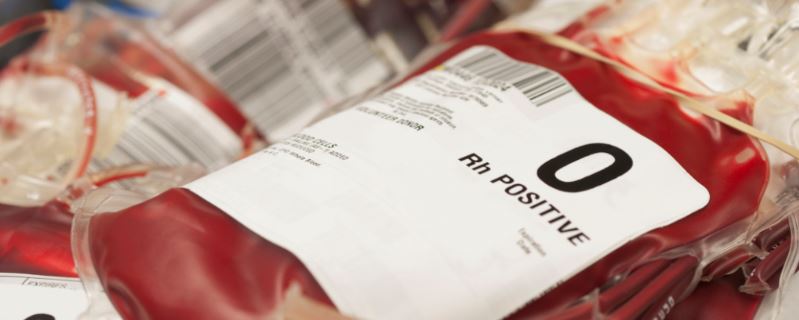


 11:37:48
11:37:48  2024-05-01
2024-05-01  849
849

When a life hangs in the balance, blood transfusions can help sustain a patient – but only if the donor's blood type is a match.
A new discovery by researchers from Denmark and Sweden could help in those emergency situations, while also easing global shortages in blood supplies.
The team identified a mixture of enzymes made by a species of bacteria found in our guts that can, in lab studies, transform red blood cells into the universal type O with "remarkably high efficiencies" – improving on an idea hatched 40 years ago.
Like virtually all cells in the human body, red blood cells are covered in a fuzz of unique sugary structures. These vary from person to person, with some sporting type A structures and others type B. Some have both A and B, and others have neither, which is designated O.
Immune systems that have never seen types A or B will attack and destroy these cells on sight if they receive them in a transfusion, whereas type O blood is far more widely accepted for most recipients.
Because of this versatility, type O blood stocks are often used up, especially in medical emergencies where doctors must act quickly without knowing a patient's blood type.
Converting red blood cells into the universal type O is not a new idea. The technique was pioneered back in 1982, when scientists discovered an enzyme extracted from coffee beans that could strip type B cells of their surface sugars.
But that enzyme reaction was very inefficient, making large-scale use impractical, and despite early promise in clinical trials, safety concerns were raised. For unknown reasons, donor blood was sometimes still incompatible in recipients despite donor cells being stripped of nearly all their antigens.
So scientists went back to the drawing board, discovering other enzymes in collections of gut bacteria as recently as 2019.
What's tricky is that there are now, as of 2022, more than 40 blood group systems beyond the ABO system and rhesus facto most are familiar with.
Even within the A and B blood groups, there are subtypes, with varying lengths and densities of the signature molecules protruding from the red cells' membranes.
"Here we report the discovery of remarkably efficient enzymes, not only against A and B antigens but also against their extensions," Mathias Jensen and Linn Stenfelt, two bioengineers at the Technical University of Denmark, write in their published paper along with their Swedish colleagues.
Based on previous work by other teams, the researchers selected a few candidate enzymes made by the gut bacterium Akkermansia muciniphila and treated red blood cells – from multiple donors and various A and B subtypes – with them.
Importantly, for potential clinical use, the enzymes were incubated with high concentrations of red blood cells, at room temperature and for only 30 minutes – improving on the longer processing and less efficient conditions of previous candidates.
"These mild conditions without additives (for example, dextran) together with excellent enzyme efficacies are important feasibility parameters in clinical applications," Jensen, Stenfelt, and colleagues note.
Crucially, the chosen enzymes also removed all four known extensions of group A and B antigens from red blood cells, in addition to the shorter, canonical A and B antigens of other blood subtypes.
Removing the long, sugary extensions reduced the incompatibility of treated B-type cells with plasma samples to less than 9 percent, and made reactions less severe where they did happen.
More work is required to understand why a small fraction of apparently sugarless red blood cells still cross-react with group O plasmas, and to improve the conversion of group A blood cells.
However, in finding enzymes that remove a greater variety of A and B antigens, the researchers say their study uncovers "a missing link" in the production of universal blood for transfusion and potentially organs for transplantation.
In 2022, researchers used a similar strategy (with different enzymes) to convert donated lungs from group A blood type to the universal type O under lab conditions. This new work might improve those efforts enough to satisfy the safety standards required for human transplant trials.
Lab-grown red blood cells are also in human trials to test whether they last longer than donated blood. If so, that could reduce the demand on blood supplies and also help patients requiring repeat transfusions avoid complications.
Reality Of Islam |
|

New scienti

This is the

A computer

Auburn Univ
 9:3:43
9:3:43
 2018-11-05
2018-11-05
10 benefits of Marriage in Islam
 7:5:22
7:5:22
 2019-04-08
2019-04-08
benefits of reciting surat yunus, hud &
 9:45:7
9:45:7
 2018-12-24
2018-12-24
advantages & disadvantages of divorce
 11:35:12
11:35:12
 2018-06-10
2018-06-10
 6:0:51
6:0:51
 2018-10-16
2018-10-16
 4:26:43
4:26:43
 2022-02-21
2022-02-21
 12:47:1
12:47:1
 2022-12-20
2022-12-20
 4:2:19
4:2:19
 2022-10-10
2022-10-10
 2:2:13
2:2:13
 2022-10-08
2022-10-08
 6:14:3
6:14:3
 2023-01-18
2023-01-18
 2:11:12
2:11:12
 2022-10-15
2022-10-15
 10:47:11
10:47:11
 2022-11-22
2022-11-22
 5:41:46
5:41:46
 2023-03-18
2023-03-18
| LATEST |